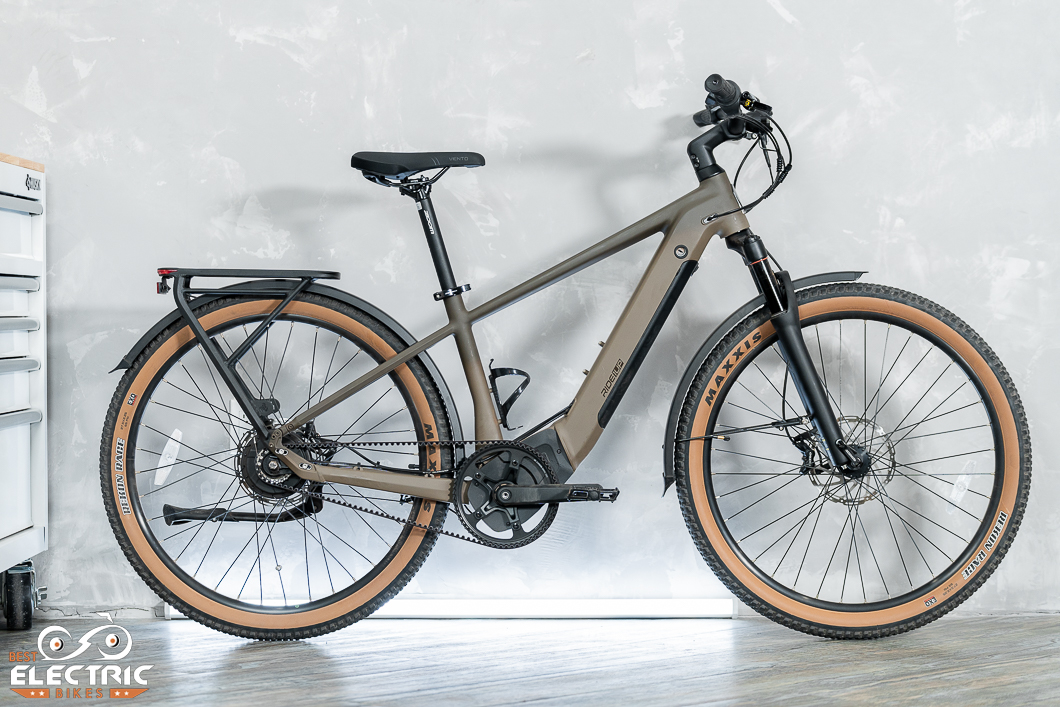
Intro
The Ride1UP Prodigy V2 is a premium commuter that lands in a somewhat more expensive price range. This owes to a number of more upscale features that we don’t often see on e-bikes that retail for less than $2000. In our Ride1UP Prodigy V2 review we will look at what makes this e-bike not just more expensive than most consumer-direct e-bikes, but a real cut above where features and quality are concerned.
So what makes the Ride1UP Prodigy V2 different? For starters, we don’t often see Brose mid-drive motors on consumer-direct e-bikes. Brose is best known for supplying the motors for Specialized’s e-bikes. A 9-speed drivetrain is out of the ordinary as well, but this sits in a price range where we would expect a drivetrain nicer than what we on e-bikes going for less than $2000. A second option allows the buyer to order it with an Enviolo Continuously Variable Transmission, a kind of internally geared hub.
Another notable feature of this e-bike is the Tektro hydraulic disc brakes which feature a 4-piston design as opposed to the more typical 2-piston design. More on what that difference means soon. Yet another upscale tough is their decision to include a 100mm-travel air-spring fork to smooth every mile.
Because this is a commuter and most buyers want a commuter that already has the basics in place, Ride1UP included front and rear lights, full fenders and a rear rack as well as a kickstand. All it needs is a pannier or two.
Shoppers can choose between the two drivetrains as well as between two different frame designs, including a traditional frame and one with a step-thru design.
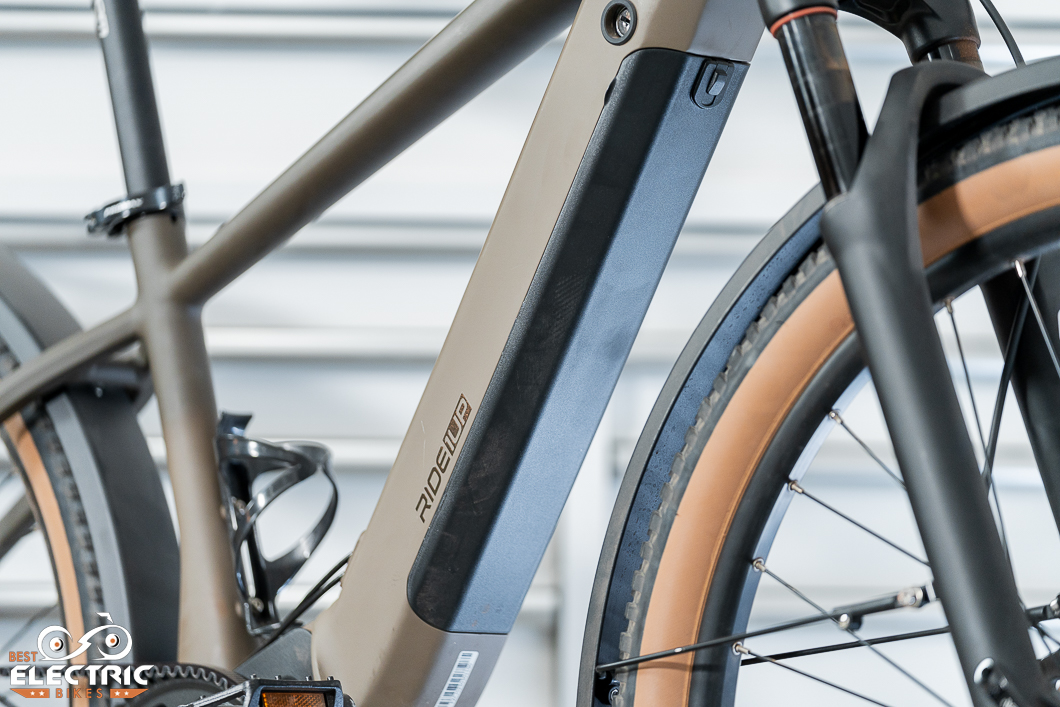
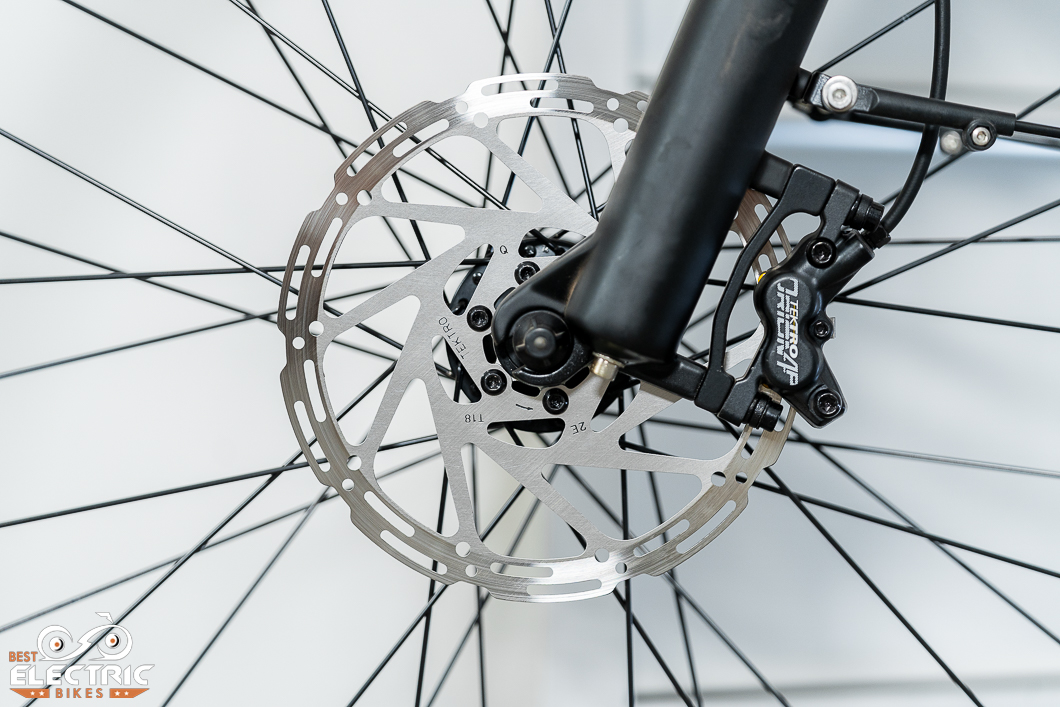
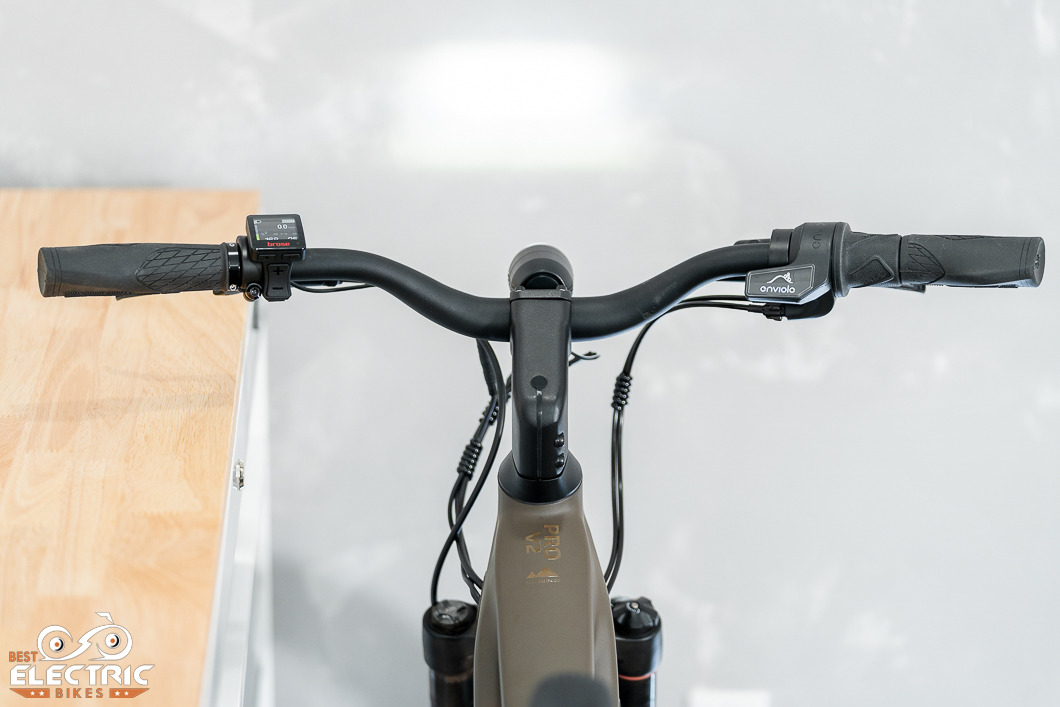
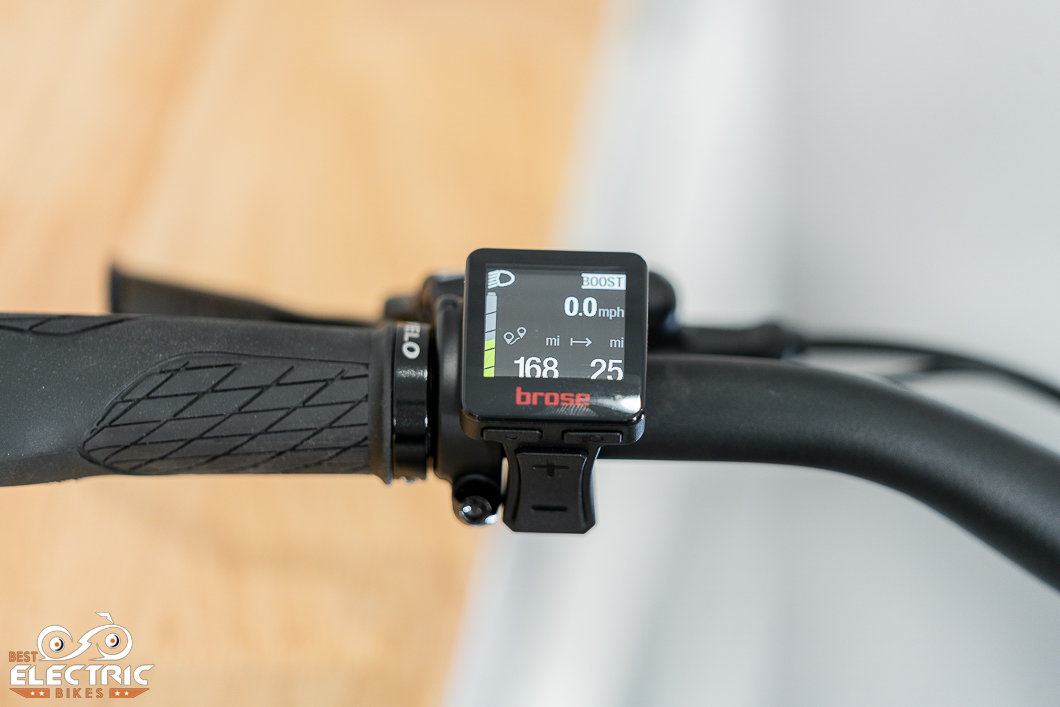
E-Bike Category: Commuter
Who the Ride1UP Prodigy V2 Electric Bike Is for: Riders looking for a more upscale commuter will want to take a deep look at this commuter with a mid-drive motor
Ride1UP Prodigy V2 Electric Bike Review Ratings:
***All ratings are relative to e-bikes of a similar style and price point***
| Speed/Acceleration | 4.8 5 |
| Hill Climbing | 4.9 5 |
| Battery Range | 4.7 5 |
| Braking | 4.8 5 |
| Construction Quality | 4.7 5 |
| Handling | 4.8 5 |
| Included Accessories | 3.8 5 |
| Warranty | 2.5 5 |
| Value | 4.9 5 |
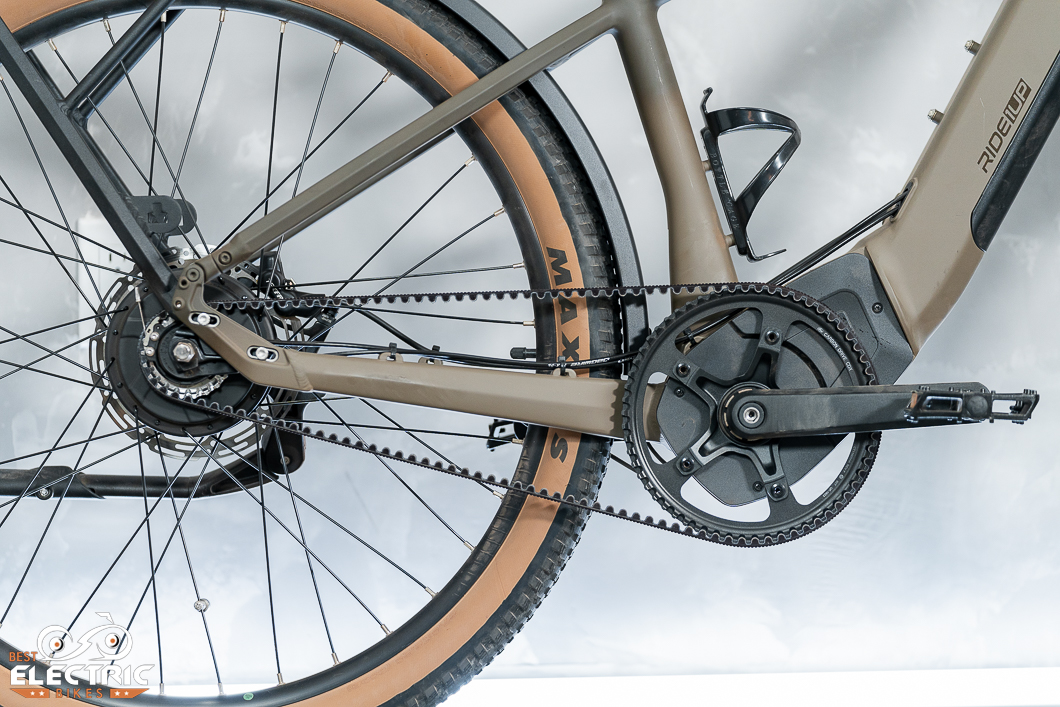
Ride1UP Prodigy V2 E-Bike Specs
- Battery: 504Wh, 36V lithium-ion, with Samsung cells
- Expected Range: Up to 50 mi. per charge
- Charger: 2A
- Motor: 250W brushless, geared mid-drive Brose motor producing 90Nm of torque
- UL Certification: N/A
- Pedal Assist:
- Throttle: Thumb button
- Display: Brose color LCD
- Headlight: 80 lux
- Taillight: 6V
- Frame: 6061 aircraft aluminum
- Fork: 100mm-travel air-spring suspension fork
- Fenders: Included
- Kickstand: Included
- Handlebars: 45mm rise, 9-degree sweep
- Grips: ergonomic rubber, lock-on
- Drivetrain: Enviolo stepless or Microshift/Shimano 9-speed
- Brakes: Tektro 4-piston hydraulic disc brakes
- Pedals: Alloy, with reflectors
- Saddle: Selle Royal Viento
- Tires: Maxxis Rekon Race 27.5 x 2.25 in.
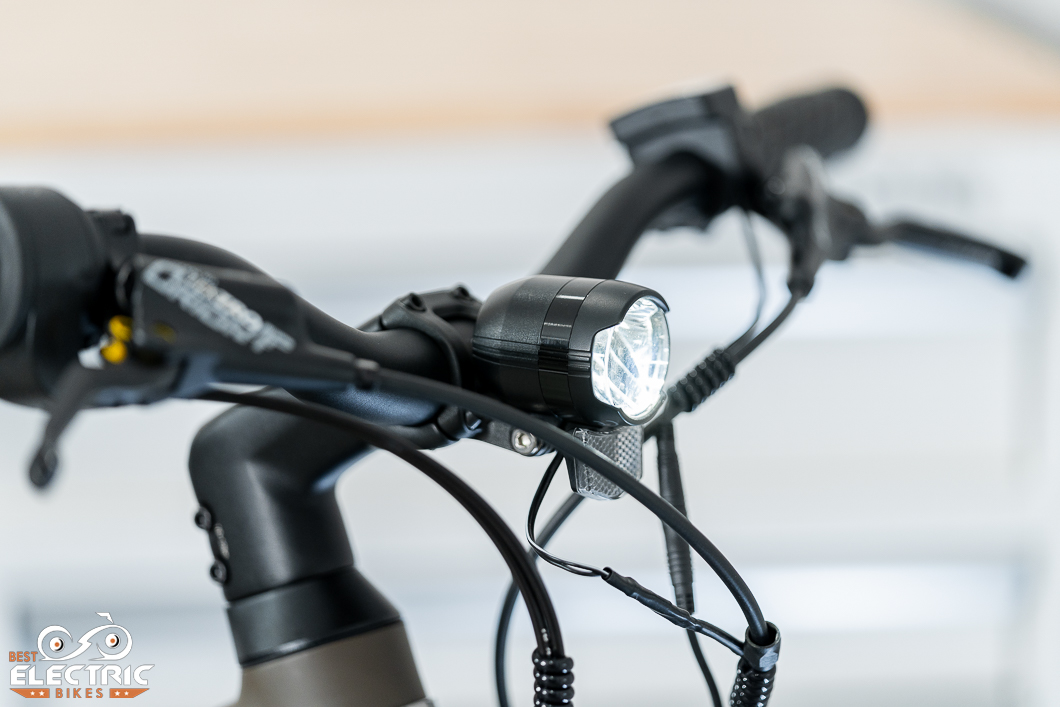
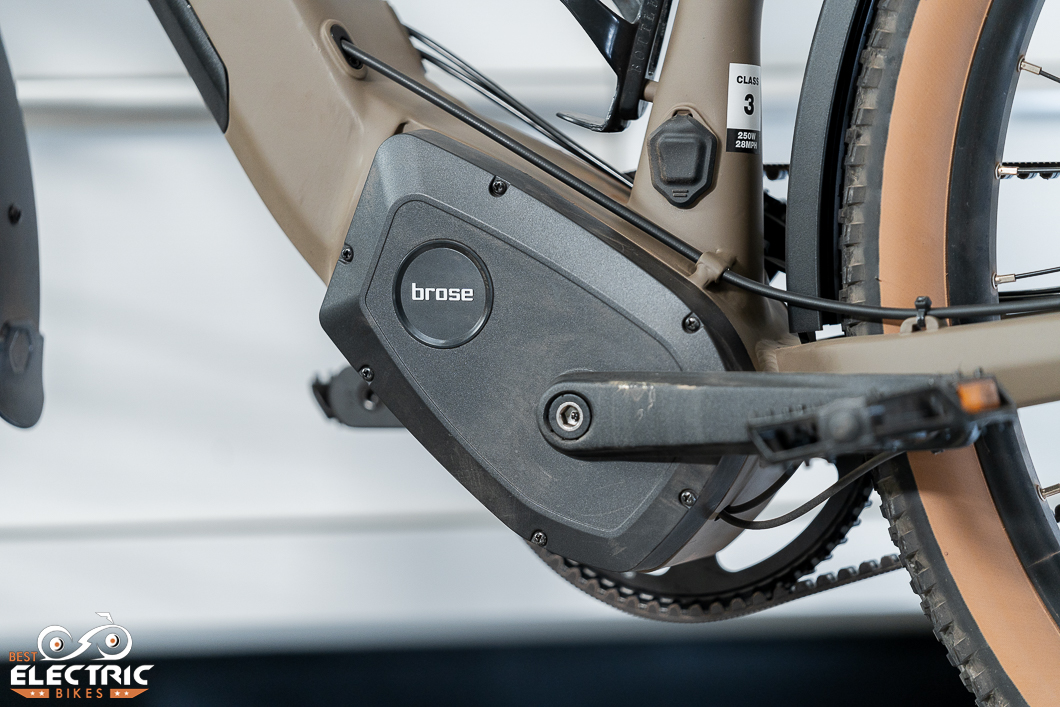
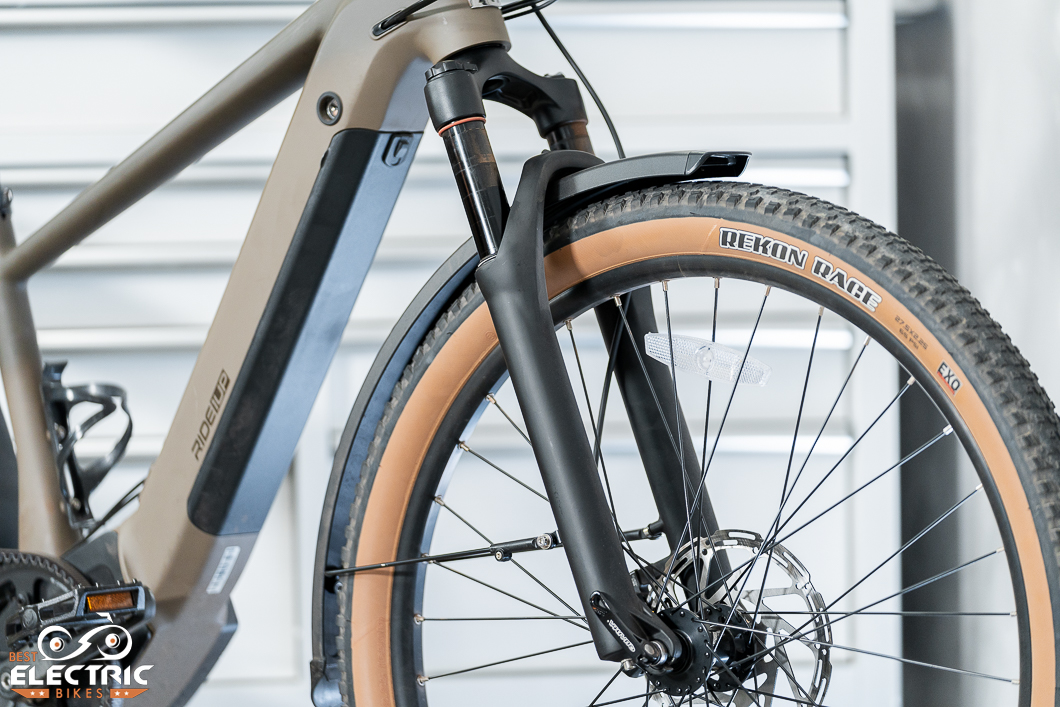
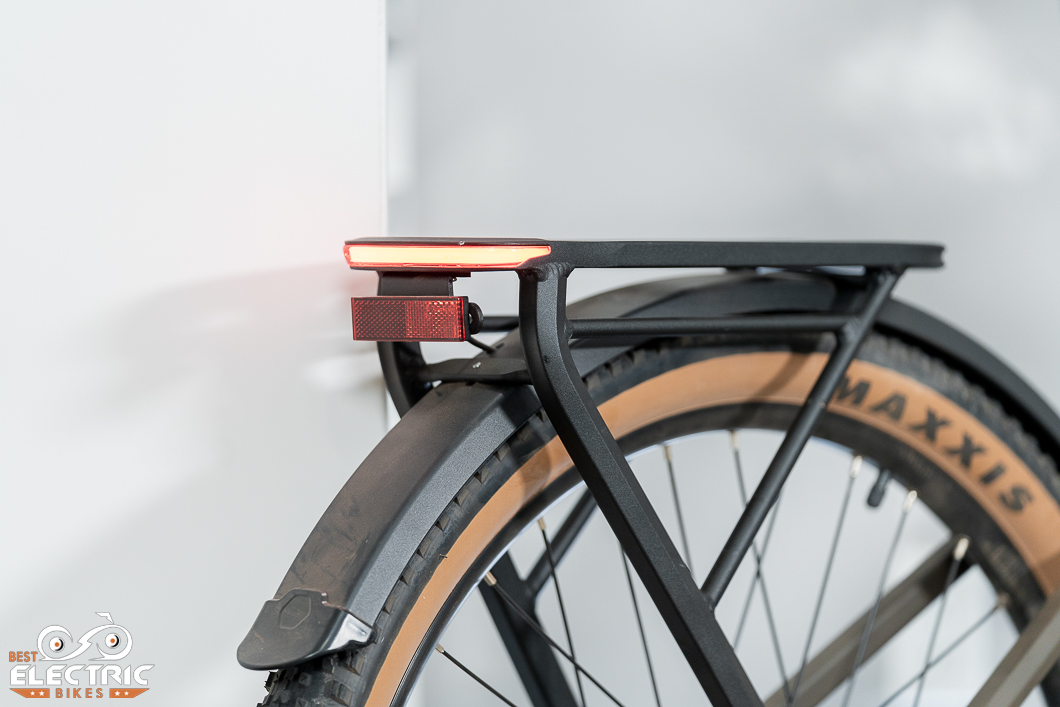
In-Depth Ride1UP Prodigy V2 Review
Ride1UP Prodigy V2 Review: Comfort, Handling, and Ride Qualities
When we discuss rider comfort, there are several things an company can do to make a rider as comfortable as possible on their ride. It would be easy to think we’re talking about putting a bigger seat on, but we’re referring to other details as whether or not someone is comfortable on a seat is a roll of the dice.
The larger a wheel is, the more smoothly it rolls over bumps, imperfections and driveway lips. The Ride1UP Prodigy V2 is equipped with 27.5-in. wheels, which are just a bit smaller than the largest production size in use, 700C. The 27.5 x 2.25-in. tires are big enough that they can be run at a reasonably low pressure (less than 30 psi for most folks) for optimal rider comfort.
Also, while we come across plenty of commuters with a suspension fork, most of them feature a steel coil spring. These forks are heavier than those that use compressed air for their spring. Air spring forks also offer a smoother ride.
The Ride1UP Prodigy V2 comes in both a traditional frame and a step-thru version. In terms of fit (possible saddle height and reach to the handlebar) the two frames are identical in size, just with one having a much lower standover height.
As is common, we think the sizing range for the Prodigy V2 to be rather optimistic. This is an e-bike that will find its best success with riders somewhere in the range of 5 feet 6 to 6 feet.
Riders looking for an e-bike that will impart a confident feel at speeds above 20 mph need look no further. The Ride1UP Prodigy V2 will offer a calm feel while still giving the rider terrific maneuverability.
Ride1UP Prodigy V2 Review: Motor, Battery, and Drivetrain Performance
The Ride1UP Prodigy is different from most commuters we review because it is equipped with a 250W brushless, geared, mid-drive motor made by Brose. Mid-drive motors don’t need to be as powerful as hub motors because they make use of the e-bike’s drivetrain to multiply their effort, same as us when we are pedaling.
With 90Nm of torque on tap, this is a very powerful motor; it equals the torque we see in some of the most powerful hub motors on the market. This is an e-bike that won’t struggle on hills. It also won’t struggle to reach this e-bike’s upper pedal-assist limit of 28 mph.
Because this is a mid-drive motor, it includes a torque sensor to communicate when the rider is pedaling to the controller. That means there will always be power the moment the rider starts pedaling and the motor’s response will be proportional to the rider’s effort, accelerating in direct response to more pressure on the pedals. E-bikes with torque sensors take a very fun experience and make it noticeably more enjoyable.
The 504Wh batter may seem on the small size relative to the e-bikes we usually review. Our general rule of thumb on battery size is that to have a reasonable range, an e-bike needs a battery roughly equal to the size of the motor; that is, a 720Wh battery matched to a 750W motor is pretty solid. The 250W Brose motor is powered by a 504Wh battery, which makes Ride1UP’s estimate of up to 50 mi. of range per charge seem rather modest. And modest it is. Our colleagues at Electric Bike Report tested the Ride1UP Prodigy V2 and it yielded more than 65 mi. of range in PAS 1 and more than 31 mi. in “Boost” mode (PAS 4, the top setting with this controller). Those are terrific results. We’re always impressed any time an e-bike exceeds the range estimates given by the manufacturer.
Buyers of the Ride1UP Prodigy V2 are presented with a choice of two different drivetrains. Option one, the less expensive option, is for a mix of Shimano and Microshift components for a 9-speed drivetrain with an 11-34T cassette. This is a notable step up in quality from most consumer-direct e-bikes by simple virtue of the 9-speed drivetrain. More gears means smaller steps between gears. This drivetrain uses an easy-to-shift trigger shifter.
Option two runs several hundred dollars more, but is well worth considering. This option is for an Enviolo internally geared hub. The Enviolo system is called a “continuously variable transmission,” which is to say that the slightest twist of the grip shifter will cause a tiny change in the gearing. This hub allows Ride1UP to spec a Gates belt rather than a chain, which reduces maintenance and the opportunity for big black smears of chain lube on clothing.
Ride1UP Prodigy V2 Review: Braking, Safety & Warranty
In yet another pleasant surprise, Ride1UP gave the Prodigy V2 4-piston hydraulic disc brakes. A 4-piston brake has double the number of pistons as a regular caliper, which gives it more braking power. Doubling the number of pistons doesn’t double braking power, but it does increase it substantially.
Normally, we only see 2-piston hydraulic disc brakes on commuters and we see 4-piston calipers on eMTBs, cargo e-bikes and some all-terrain e-bikes. We didn’t expect to see them here, but it’s yet another upgrade over what we usually see, which helps to make the case for this e-bike that goes for more than $2000.
When we talk about the safety of an e-bike, often what we are discussing is a matter of quality. Are the parts well-made? Ride1UP has a proven reputation for making quality e-bikes, so that’s not at issue here. Our next big consideration is control. For a rider to perceive that they are safe while riding, they need an excellent sense of control. The combination of wide, grippy tires, 4-piston hydraulic disc brakes and a 100mm-travel, air-spring fork all contribute to this e-bike being one that will be easy for any rider to feel in control of. Torque sensors also add to a rider’s sense of control because there’s no lag between when a rider starts pedaling and the motor kicking in or the motor continuing for another second after the rider has ceased pedaling.
Ride1UP covers the Prodigy V2 with a one-year warranty. This isn’t unique among consumer-direct e-bikes, but given the overall quality of this e-bike, we’re surprised the warranty isn’t longer. Our issue with the warranty isn’t that we think several years will pass before a warranty issue would arise, but that we would be surprised if a warranty issue ever arose.
Ride1UP Prodigy V2 Review: Recommendation/Final Verdict
Of the many categories of e-bikes on the market, commuters are the most popular for obvious reasons. There are lots of choices in the $1000-$2000 price range. But what’s a shopper to do when they want an e-bike with nicer features than what we typically see from the consumer-direct companies. Ride1UP has answered that question with the Prodigy V2.
The beauty of the Ride1UP Prodigy V2 is that it splits the difference in both features and cost from the most value-packed consumer-direct e-bikes and the high-quality commuters produced by the big legacy companies like Trek and Specialized. We’ve discussed how the Ride1UP Prodigy V2 outdoes its less-expensive competition, but now we are going to take a look at how this e-bike differs from those more expensive e-bikes.
When someone makes the jump in investment (on the order of an additional $1000) to a higher-end commuter, here are the major differences they will see between that e-bike and the Ride1UP Prodigy V2: The first, biggest difference will be the fact that with companies like Trek and Specialized, they will see will be that those e-bikes will be made in multiple sizes, generally three or four. They will offer both traditional and step-thru frames in most models, but the variety in sizes will make a big difference to shoppers who are either above or below average in height.
The legacy brands rarely spec a drivetrain of less than 10 speeds these days, and the average 10-speed drive gives a noticeably wider range of gears than the 9-speed drivetrains on the market. We’d like to tell you there would be more differences or more significant differences, but that’s part of what makes the Ride1UP Prodigy V2 so impressive: It may be more expensive than most consumer-direct e-bikes, but it is a remarkably well-equipped e-bike, which more than justifies its higher price range.
Aside from directing riders looking for a higher-quality e-bike to the Ride1UP Prodigy, there are a couple of reasons to consider this commuter. People living in especially hilly areas will benefit from the smaller steps in gears with the 9-speed system or the itty-bitty steps with the Enviolo CVT. With the 4-piston disc brakes, people who live in places that are both rainy and hilly (looking at you, Seattle) will benefit from the extra braking power.
The biggest difference of all is the mid-drive motor and what that does for the e-bike’s ride. It shaves a few pounds from what similar commuters might weigh (58 lbs. for the 9-speed version and 61 lbs. with the Enviolo CVT). Mid-drive motors offer terrific acceleration and can’t-stop-won’t-stop performance on hills. And they tend to be more efficient on battery use.
We see lots of cool e-bikes and this is one that merits looking at e-bikes north of $2000.
Thank you for reading through our review of the Ride1UP Prodigy V2. Still have further questions? Wondering how it compares to a similar e-bike we’ve reviewed? Let us know in the comments below!
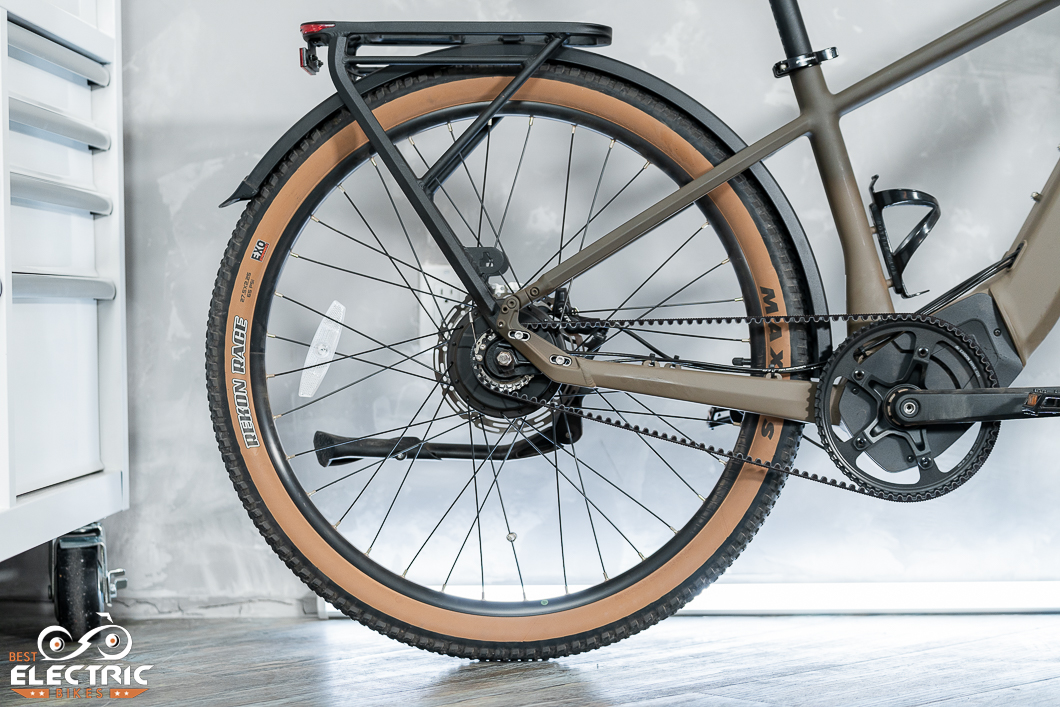
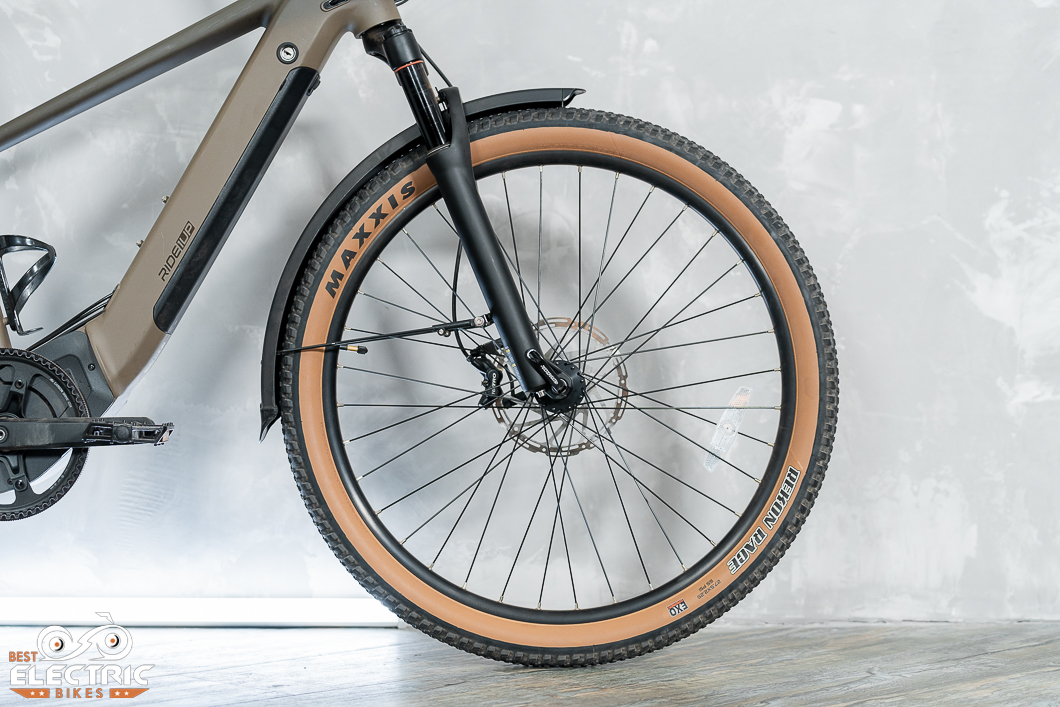
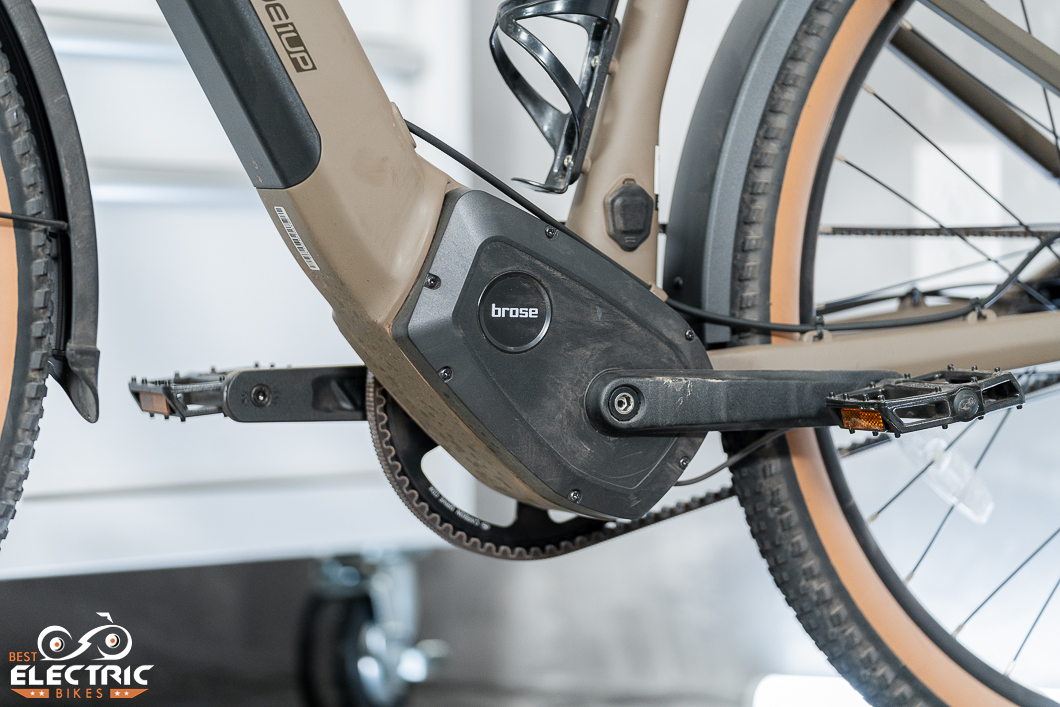


Leave a Reply